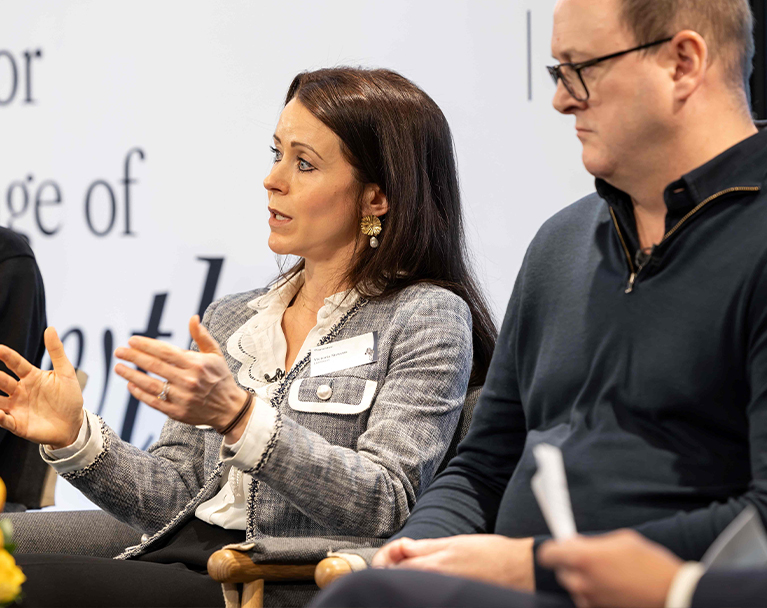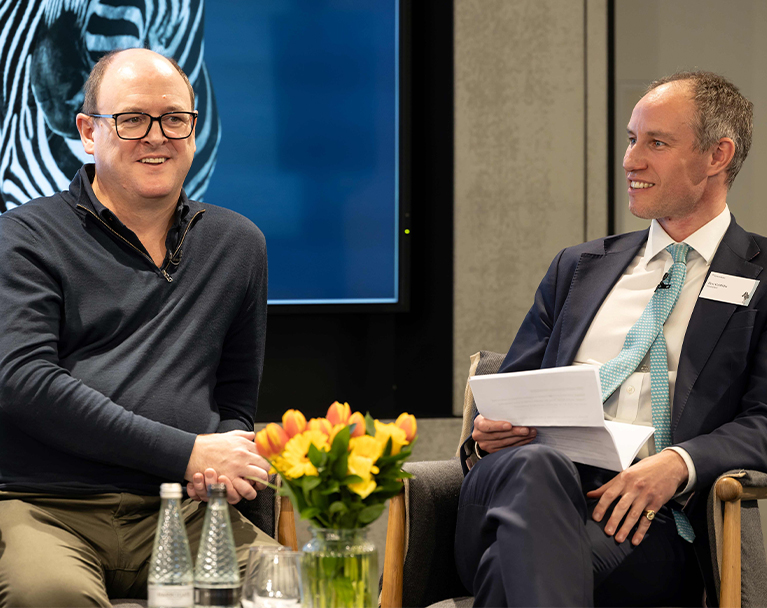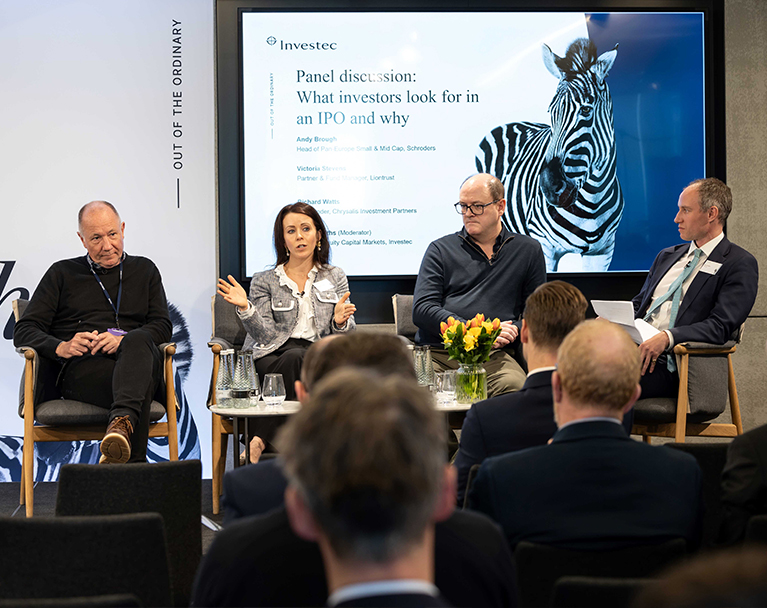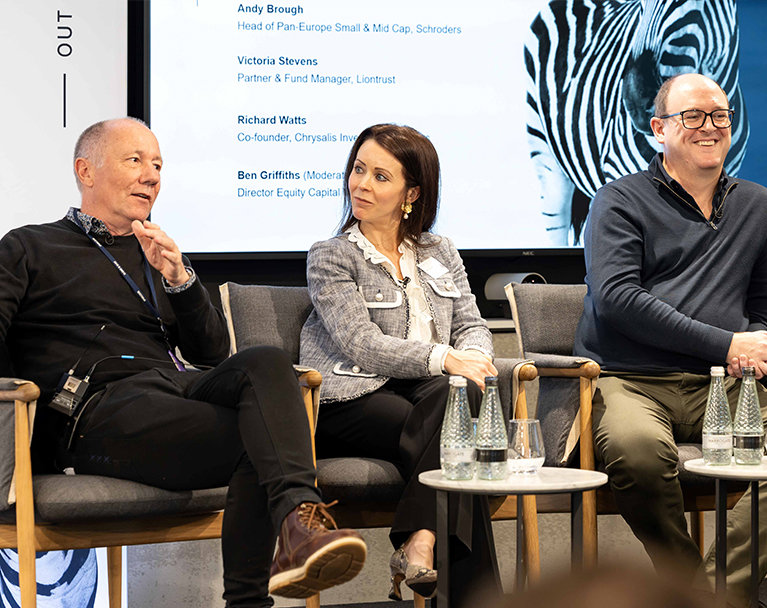Participants in the panel discussion at Investec’s 2024 IPO Conference were drawn from across the UK’s asset management industry, including two firms in Schroders and Liontrust which are themselves publicly listed. They shared their views on the benefits and ramifications of conducting an initial public offering (IPO), along with the challenges facing the UK equity market.
Ben Griffiths, Director of Equity Capital Markets at Investec, chaired the debate and started by asking about the advantages of a public listing.
“There are so many benefits to being listed,” said Liontrust Asset Management’s Victoria Stevens, a Partner and Fund Manager. “As a listed company, you’ve got access to a diverse range of views from different shareholders, many of whom will have a long-term and collaborative partnership approach. Whereas if you’ve got a single owner, you’re going to be doing what the owner wants to do.”
Access to capital, thought Chrysalis Investment Partners’ Co-founder Richard Watts, is also a significant advantage of a public listing. “In the pandemic, shareholders stepped in and they were very supportive. [Public] companies could raise money very, very quickly.”
He added: “Businesses have been staying private for longer, and some of the most innovative and fast-growing companies have been light on capital. But most founders we come across don’t want to sell their business - they want to take their companies through to an IPO.”

As a listed company, you’ve got access to a diverse range of views from different shareholders, many of whom will have a long-term and collaborative partnership approach. Whereas if you’ve got a single owner, you’re going to be doing what the owner wants to do.
Why domestic IPOs lost their sheen
The panellists agreed that the UK’s subdued equity market has temporarily reduced the appeal of domestic public offerings.
“It’s absolutely critical that there is a properly functioning, thriving market, and it’s a real frustration that the UK stock market isn’t functioning very well,” said Watts. This sentiment was echoed by Stevens, who also outlined the challenges caused by outflows from UK equities and the resulting impact on valuations.
Schroders’ Andy Brough, Head of the firm’s Pan-Europe Small and Mid-Cap team, pointed to the UK market’s response to Covid-19 as “its finest hour”, but recognised the need to broaden participation in equity ownership to improve liquidity.
“In the 1950s, Mr and Mrs Jones invested in shares of a company. The company would open factories or invest in systems, and Mr and Mrs Jones were rewarded for their investment with a rising stream of dividends from the company’s rising stream of earnings,” he elaborated.
A return to favour for IPOs?
Stevens, noting the impact of outflows and interest rates on UK equity markets, remained positive on the longer term outlook for the UK equity and IPO markets. Whilst historically low rates significantly increased the attractiveness of debt financing for many years, she noted that “[Conditions] are clearly no longer quite so benign for [those investors], so that puts the equity market at a relative advantage.”
Perhaps more significant, she continued, is a general attitude of negativity towards UK stocks.
“It’s been popular, in recent years, to bash the UK – saying we underperform, the businesses are at depressed valuations,” she observed. “The problem is that can become self-fulfilling. If asset allocators increasingly allocate away from the UK towards global markets, it puts pressure on company valuations, and then the market underperforms and investors redeem.”
She remains passionate, however, about the importance of a thriving UK stock market, and the number of “amazing businesses in the UK that we [UK investors] can support at the right moment in their journey”. It is important to remember the growth capital that a listing can provide, with Stevens recalling that many of her team’s small and mid-cap holdings were able to swiftly raise equity during Covid-19, not to shore up over-stretched balance sheets, but rather to capitalise on opportunities presented by the disruption.
The shape of IPO success
So, what does a successful IPO look like? Chrysalis’ Watts argued that a set of time-honoured yet straightforward rules should be observed by any firm interested in going public.
“It’s the old mantra, really, of under-promise and over-deliver,” Watts said. “Unfortunately, many companies get that the wrong way around – they over-promise when they’re starting out, or they hang the investment thesis around things that are very difficult to achieve.”
Investors, Watts continued, pay close attention to the promises made by companies and will respond swiftly if companies don’t live up to the hype.
“If you come out and you disappoint, it can impair your share price in a way that is very difficult to recover from,” Watts said. “The advice we give to private companies is: Be very careful about the timing of your IPO. Wait until the point where your strategy is set and you can execute that strategy.”
“The market wants to know your base forecasts,” agreed Stevens. “Investors need to know they’ve got a floor that they can build their expectations on.” She also explained the importance of an alignment of interests between company management and new shareholders, explaining that “managers who own equity stakes in their businesses are likely to share our long-term approach to value creation, and by hitching our wagon to them we're benefitting from that entrepreneurial, long-term approach.”
IPO valuation challenges
A market consists of an aggregation of views and so there is no single way to think about valuation at IPO. Valuing an IPO, the panellists said, comes with challenges. Firms can often give in to the temptation to present their data in an unrealistically positive way, Schroders’ Brough suggested.
“We always insist on having 24 hours with the prospectus, because that document has to be signed off by lawyers,” he said, explaining the importance of the objective picture that can be built through analysis of the financial statements.
Explaining the breadth of factors to consider when valuing an IPO, Stevens added that whilst maximising value at the time of the IPO can seem attractive, it is important to think about the IPO as the start of a journey.
“Your valuation at the point where you float will be dependent on a multitude of factors, some of which are in your control and some of which aren’t,” she said. “It will depend on your sector, your growth biases, your margin accretion potential, your free cash flow potential, your leverage.
“Companies really need to think carefully about their market journey, including the balance of long-term institutional holders who you can bounce strategic ideas off, who can be there for you as cornerstones of any potential capital raise, and [investors] at the other end who can help to generate liquidity. It shouldn’t be about the highest valuation you can possibly get away with on day one.”
Watch the IPO Conference 2024 highlights
Start a conversation
Important information:
Investec Bank plc provides this media for information purposes only. The opinions featured are not to be considered as the opinions of Investec and does not constitute advice. It is advisable to contact a professional advisor if you need financial advice. Your use of and reliance on any of this content is entirely at your own risk.
Browse articles in




